Edward Royle (born 29 March 1944) is a British academic who is Emeritus Professor of History at the University of York and author of several books on the history of religious ideas, particularly in York and Yorkshire.
Edward Royle (born 29 March 1944) is a British academic who is Emeritus Professor of History at the University of York and author of several books on the history of religious ideas, particularly in York and Yorkshire.
Royle gained his PhD at the University of Cambridge. He spent the majority of his career in the Department of History at the University of York, where he retired as an emeritus professor. He is an active member of the University's Centre for Eighteenth-Century Studies. His main research interests have been in the history of York and Yorkshire since the mid-eighteenth century.
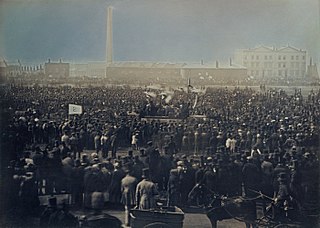
Chartism was a working-class movement for political reform in the United Kingdom that erupted from 1838 to 1857 and was strongest in 1839, 1842 and 1848. It took its name from the People's Charter of 1838 and was a national protest movement, with particular strongholds of support in Northern England, the East Midlands, the Staffordshire Potteries, the Black Country and the South Wales Valleys, where working people depended on single industries and were subject to wild swings in economic activity. Chartism was less strong in places, such as Bristol, that had more diversified economies. The movement was fiercely opposed by government authorities, who finally suppressed it.
George Jacob Holyoake was an English secularist, co-operator and newspaper editor. He coined the terms secularism in 1851 and "jingoism" in 1878. He edited a secularist paper, the Reasoner, from 1846 to June 1861, and a co-operative one, The English Leader, in 1864–1867.
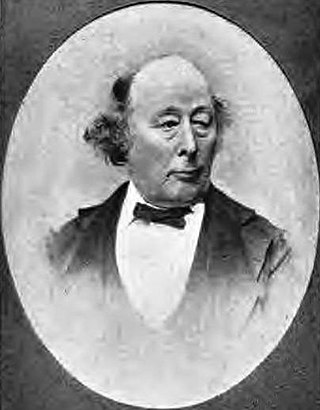
Collet Dobson Collet was an English radical freethinker, Chartist and campaigner against newspaper taxation.

George William Foote was an English secularist, freethinker, republican, writer and journal editor.
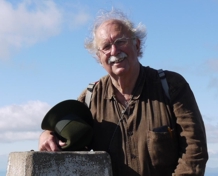
John Charles Barrell FBA FEA is a British scholar of eighteenth and early nineteenth century studies.
The Leader was a radical weekly newspaper, published in London from 1850 to 1860 at a price of 6d.
John A. Tosh is a British historian and Professor Emeritus of History at Roehampton University. He gained his BA at the University of Oxford and his MA at the University of Cambridge. He was awarded his PhD by the University of London in 1973; his thesis topic being "Political Authority among the Langi of Northern Uganda, circa 1800–1939". He is a Fellow of the Royal Historical Society. In 1987–88 he held a visiting appointment at the University of California, Davis. At Roehampton University he teaches History, specifically "Reading and Writing History". He served as Vice-President of the Royal Historical Society from 1999 to 2002. He has also published several works on the history of masculinity in nineteenth-century Britain. He is currently preparing a critical analysis of the social applications of historical perspective in contemporary Britain.
William Chilton, was a printer, Owenite, evolutionist, and co-founder with Charles Southwell of The Oracle of Reason, which claimed to be the world's first avowedly atheist journal.
The National Reformer was a secularist weekly publication in 19th-century Britain (1860–1893), noted for providing a longstanding "strong, radical voice" in its time, advocating atheism. Under the editorship of Charles Bradlaugh for the majority of its lifespan, each issue stated that "The editorial policy of the Paper is Republican, Atheistic, and Malthusian, but all opinions are freely admitted, provided only that they be expressed reasonably and in proper language."

Secular Review (1876–1907) was a freethought/secularist weekly publication in nineteenth and early twentieth-century Britain that appeared under a variety of names. It represented a "relatively moderate style of Secularism," more open to old Owenite and new socialist influences in contrast to the individualism and social conservatism of Charles Bradlaugh and his National Reformer. It was edited during the period 1882–1906 by William Stewart Ross (1844–1906), who signed himself "Saladin."
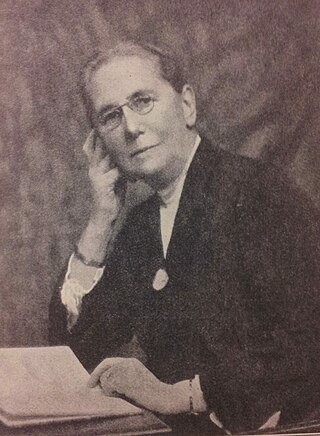
Hypatia Bradlaugh Bonner was a British peace activist, author, atheist and freethinker, and the daughter of Charles Bradlaugh.
Harriet Teresa Law was a leading British freethinker in 19th-century London.
The British Secular Union was a secularist organisation, founded in August 1877, primarily as a response to what its founders regarded as the "dictatorial" powers of Charles Bradlaugh as President of the National Secular Society. The founding members were Kate Watts, Harriet Law, George William Foote and Josiah Grimson; George Holyoake had accepted the nomination of Vice President of the National Secular Society so only gave support for the formation. The group adopted the Secular Review as their official paper.
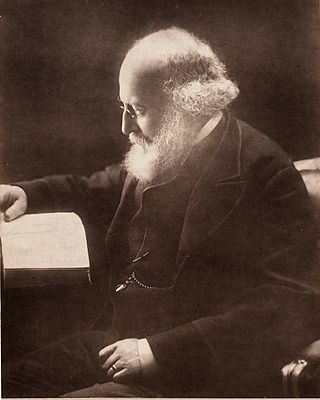
Thomas Evans Bell was an English Indian army officer and writer. He used the pseudonyms Undecimus and Indicus (1865).
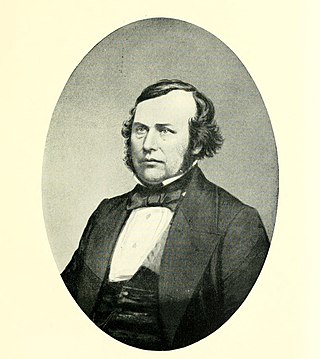
Robert Buchanan (1813–1866) was a Scottish socialist writer and lecturer, and journalist.
Richard Moore (1810–1878) was an English radical politician. He was a moderate Chartist, and heavily involved in the campaign against "taxes on knowledge".

Taxes on knowledge was a slogan defining an extended British campaign against duties and taxes on newspapers, their advertising content, and the paper they were printed on. The paper tax was early identified as an issue: "A tax upon Paper, is a tax upon Knowledge" is a saying attributed to Alexander Adam (1741–1809), a Scottish headmaster.

Simon Alexander Lindsay Gunn is a historian who was Professor of Urban History at the University of Leicester from 2006 to 2021.

Austin Holyoake was a printer, publisher, and freethinker. The younger brother and partner of the more widely known George Jacob Holyoake, Austin Holyoake was himself a significant figure in nineteenth century secularism.
William John Birch (1811–1891) was an English rationalist writer.